
- Home
- Travel Packages
- Top Destination
-
Travel Attraction
By Category
Top Attraction
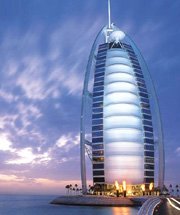
- Travel Agents
- Car Rentals
- Hotels
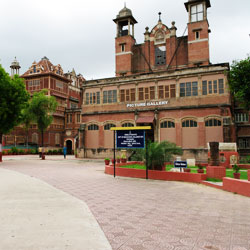
Ahmedabad, as many know is the former capital of Gujarat, and is flocked by travellers all year round. It is reckoned as the fifth largest city and also claims its name to fame for having the seventh largest metropolitan area in the country. It is the erstwhile capital of Gujarat and the administrative headquarters of the Ahmedabad district. Besides that it is also the seat of Gujarat High Court. The city also captured the attention of the world when it earnestly bagged the third position amongst the fastest growing cities of the decade. In old times Ahmedabad was called Ashaval (or Ashapalli). The land has been providing occupation to large number of people since 11th century. The city became part of the Bombay Presidency during the British rule. After independence the city developed its textile industry that is why it also often referred as "Manchester of the East". During the Indian struggle for freedom, two ashrams were also built here.
Explore More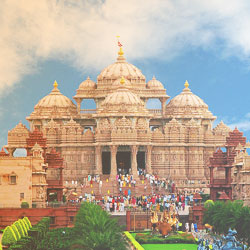
Gandhinagar is the capital of the Gujarat and largest city in the state. The history of the city dates back to 13th century when the region was part of King Pethasinh of Pethapur’s rule. The year 1960 was an important year in the making of the city as Bombay was split and the country had two different states, Gujarat and Maharashtra. Gandhinagar is situated 23 km away from Ahmedabad and 464 km away from Mumbai. The city has been divided into 30 sectors and each sector boasts its own shopping mall, school, community centre, health centre etc. There are parks, and recreational areas that sprawl along the water bodies and which also eventually grant the city a green-city atmosphere. Thousands of people flock to the city to see the Akshardham temple. In past there have been plans to turn the city into a complete Indian enterprise as Gujarat is also the birthplace of the father of the nation, Mahatma Gandhi.
Explore More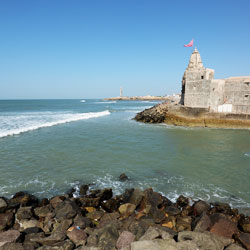
Dwarka is a municipality and city of Devbhoomi Dwarka district situated in Gujarat. The city is counted as one of the four Hindu pilgrimage sites and is frequented by many pilgrims throughout the year who wish to take a chardham expedition. Besides enjoying the spiritual vibes, one can also explore the culture and tradition of the land overwhelmingly. The average literacy rate in the city is 64%. The male literacy rate is 72% and female literacy rate is 55%. According to the official statistics 13% of the population is under six years of age. Many archaeological excavations done in the region have lead to discovery of many stone structures. These structures depict settlement during the proto-historic times beautifully. Dwarka is also referred as the Dwaraka Kingdom, an old kingdom of Lord Krishna. It is also said that it was the first capital of Gujarat. In 200 BCE, the Dwarakadheesh Temple was constructed in Dwarka and which was later enlarged in the 17th century.
Explore More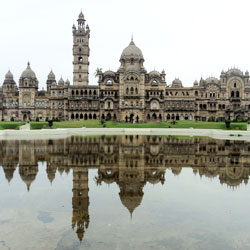
Vadodara is a city of Gujarat and is also counted as the third largest city of the state. It also ranks as the 18th largest city in the country. The city is a reached by many travellers throughout the year for scads of reasons.
Explore More
Somnath, literally meaning the lord of the moon, is a small town located in the Western Ghats of Gujarat. It is a pilgrim site which is visited by thousands and lakhs of devotees every year to pay homage to Lord Shiva. It houses one of the 12 Jyotirlingas and has many other places that have strong connections to Indian mythology. This town is known solely for its religious importance that renders it a major tourist attraction in Gujarat. While the summers can be quite hot in Somnath, winters have a moderately cool climate and that's when most of the pilgrims flock this religious site. The main attraction in this city which has even donated its name to the town is the Somnath Temple. There are many legends hovering around this temple. One can also witness many other spots like the Laxminarayan Temple, Triveni Sangam, Parshuram Temple, Panch Pandav Gufa, Gita Temple, Suraj Mandir, Shashibhushan Mahadev and Bhidbhanjan Ganpatiji Temple. Apart from these religious places, Somnath also has a few beaches that would be perfect to rest your body after resting your soul in these temples.
Explore More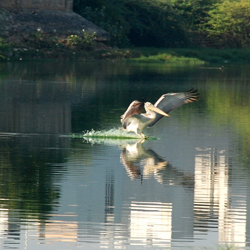
Porbandar is a coastal city in Gujarat. It is known best as the birth place of Mahatma Gandhi, father of the nation. Porbandar is also known by the name of Sudamapuri. It is named after Sudama, friend of Lord Krishna in Dwaparyuga. Porbandar has its historical roots connected with the Harrapan age because it served as the place for maritime activities on the present day coast of Saurashtra. Perched on the shoreline of Arabian Sea, Porbandar is spread across 2,298 sq. kms. It is surrounded by Dwarka in north and Junagadh in south and Arabian Sea to its west. With its location near the Sea, the climate of Porbandar is semi-arid. The mercury level reaches upto 42 degrees during summers whereas ranges between 5-15 degrees during winter season. There are many notable attractions in Porbandar. Some popular names that frequented by visitors include Kirti Mandir, Bharat Mandir, Barda Wildlife Sanctuary, Miyani Beach and Willingdon Beach. The majority of populace in Porbandar communicates in Gujarati and Hindi.
Explore More
Kutch is city in the Indian state of Gujarat. Digging up its etymology, the name 'Kutch' means the piece of land that intermittently becomes wet and dry. Kutch has its historical relations with the inception of Indus Valley civilization. Till the early 18th century, Kutch was ruled by different dynasties and finally came under the British rule. Today, it is a frequented tourist destination in the state of Gujarat. Kutch sprawls enormously across an area of 45 sq. km. that makes it the largest district in India. The substantial part of the land of Kutch is a white desert. It turns into a wetland during monsoons and transforms back during the dry months. The climate of Kutch is tropical temperate that brings searing summers and pleasant winters. The average mercury level during the summer season rests at 36°C and 27°C in winters respectively. Kutch is an alluring destination in Gujarat and lies among the most frequented places in India. It houses prime attraction like the white deserts and various sanctuaries that attract the tourists on a larger scale. The annual fest of Kutch is held between the months of January-February and different dance forms are presented. There are amazing malls and the museums that ensnare the tourists.
Explore More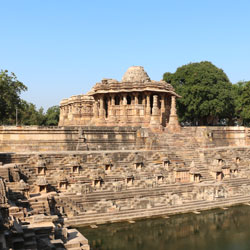
Modhera is a small town located in the Mehsana district of Gujarat. This town was known as Dharamanya in the puranic age. According to the legends, Lord Rama did penance at Modhera to cleanse the sin of killing the demon Brahmin scholar Ravana. Also, this town is popular for housing the astounding Sun Temple that was constructed during the Chalukyan rule in the region. It is now looked after by the Archaeological Survey of India. Modhera stands on the banks of the River Pushpawati and is elevated at a height of 600 feet above the sea level. The land of this region is a jagged terrain. Modhera has a tropical climate. It encounters warm summers with the median temperature of 35°C and pleasant winters with the average temperature of 14°C. It receives a heavy rainfall during the monsoon season. The annual average rainfall received by Modhera is 2800 mm. Modhera is best-known for housing the Sun Temple. It is a 10th-century grandeur that was constructed during the reign of King Bhima I of the Chalukyan dynasty. It is carved with intricate detailing done on the exteriors as well as interiors.
Explore More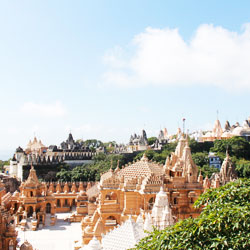
Bhavnagar is a city located in the Indian state of Gujarat. It was a princely state in the bygone times that was founded by Bhavsinhji Gohil in the 17th century. He was the first and the last Indian ruler that ruled for the longest time. His army was strong enough to defeat the Maratha and Muslim but surrendered to the British. The city of Bhavnagar is elevated 90 feet above the sea level. Its rugged terrains span a gross area of 130 sq. km. A perennial river by the name of Kansara passes through and feeds the land of Bhavnagar. The region faces a subtropical wet climate. It witnesses normal summers with an average temperature of 38°C. The winters are mild with a median mercury level of 16°C. The monsoon season is accompanied by cyclones and Bhavanagar receives heavy rain shower during the season. There are several places that are located in Bhavnagar. The notable tourist attractions include the names like Takhteshwar Temple, Nilambaug Palace, Bhan Vilas Palace, intricating temples of Palitana, Ghogha Beach, and much more.
Explore More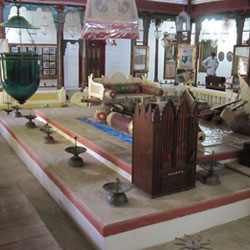
Bhuj is a city located in the Indian state of Gujarat. This city was established by Rao Hamirji in the year 1510. Since then, the land of Bhuj was ruled by the local chieftains like Naga and Jadeja. This city has faced major earthquakes in past. The first earthquake arrived in the 18th century and killed nearly 200 people. The second earthquake struck Bhuj on January 26 in the year 2001. There was a major loss of human life and property. But defeating all these calamities, today, Bhuj has developed and attracts numerous tourists on a large scale. The city of Bhuj is elevated 360 feet above the sea level. It is beckoned by Bhujia Hill that is the highest point in Bhuj. It's rough terrains sprawl over 56 sq. km. The climate of Bhuj is described as humid in nature. It faces the median temperature of 37°C during summers and 20°C during the winter season. It receives 2600 mm of annual rainfall. The visitors can see different places of interest in Bhuj. The places like Bhujia Hill, Aina Mahal, Prag Mahal, Rama Kund, Kutch Museum, Tapkeshwari Temple, and crowded markets of Bhuj should be visited.
Explore More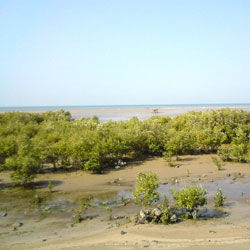
Jamnagar is a beautiful city located in the Indian state of Gujarat. This city was founded by Jam Rawal in the mid-fifteenth century. At that time, it was an erstwhile princely state under the name of Nawanagar. The city's architecture was reconstructed by the descendant of Jam Rawal, Maharaja Ranjitsinh Rawal. The present day structure of the city is the brainchild of Ranjitsinh Rawal. It is one of the most important cities in the state of Gujarat. With an elevation of 56 feet above the sea level, Jamnagar covers the gross area of 130 sq. km. It's jagged plains share the boundaries with Gulf of Kutch in North, Devbhoomi Dwarka in West, Porbandar in Southeast, and Rajkot in East. The climate of this region is tropical in nature. It faces scorching summers with a median temperature of 38°C and pleasant winters with median mercury level of 14°C. It receives an annual average rainfall of 2450 mm. There are different places of interest located in Jamnagar. The remarkable tourist attractions in Jamnagar are Darbargardh Palace, Lakhota Fort, Willingdon Crescent, Pratap Vilas Palace, and other places like Marine National Park, Bird Sanctuary, and different Hindu shrines.
Explore More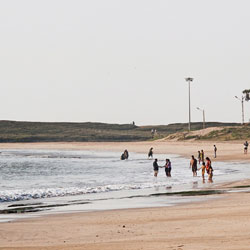
Junagadh is an ancient city that lies in the Indian state of Gujarat. Junagadh has its historical connections with the numerous dynasties that ruled over its soil. The Maurya dynasty, Chudasama dynasty, and the Chalukhya dynasty were the ones that reigned over Junagadh. During their rule, different monuments were erected. Located in the foothills of the Mount Girnar, Junagadh is elevated at 350 feet above the sea level. It has the rough terrains that constitute a majority of its land. There are some small streams that are a key source for irrigating the fields and supplying in homes. The climate of the area is moderate in nature. It faces normal summers as the median mercury levels do not rise above 35°C. The winter season is pleasant as average temperatures stay below 13°C. Junagadh is the residence of bewitching monuments. These monuments now fall under A.S.I and its authorities look after them. These include the carved boulders from Mauryan period that hold the texts in Brahmani script, a preserved palace from the Chalukhyan period, different small museums from Chudasama period, and local markets of Junagadh.
Explore MoreGujarat Tour Package 9 Night - 10 Days
10 Days/ 9 Night
Ahmedabad - Junagadh - Porbandar - Rajkot - Dwarka - Somnath
Gujarat Tour Package 9 Night - 10 Days
10 Days/ 9 Night
Junagadh - Rajkot - Vadodara (Baroda) - Dwarka - Somnath - Diu
10 Days Gujarat Tour From Ahmedabad
10 Days/ 9 Night
Ahmedabad - Junagadh - Porbandar - Rajkot - Dwarka - Somnath
06 Nights / 07 Days - Ahmedabad Tour Package
7 Days/ 6 Night
Ahmedabad - Vadodara (Baroda) - Somnath - Dwarka - Narmada
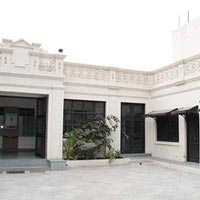
Rajkot is a city that is located in the central region of Gujarat. It is known as the 4th largest city in the state after the cities of Vadodara, Ahmedabad, and Surat. Its region had been ruled by the different dynasties like Mughal, Rashtrakuta, Chola and lastly by the British. Today, this city is counted amid the 22 fastest developing cities of the world. One should visit the city of Rajkot once in the lifetime. Rajkot is located on the banks of Aji River. It remains dry throughout the year and flows ferociously during the monsoon season. Rajkot is elevated at a height of 420 feet above the sea level. A major portion of its land is a rough terrain and it covers an entire area of 170 sq. km. The climate of the region of Rajkot is described as subtropical in nature. It faces searing temperatures during summers with an average of 37°C. The winter is a pleasant season as the median temperatures of 13°C makes the weather enjoyable. Rajkot houses many attractions in its vicinity. The notable destinations that lure the visitors are The Rotary Doll Museum, Gandhi Smriti, Jubilee Garden, Trimandir, and the astir shopping malls of Rajkot.
Explore More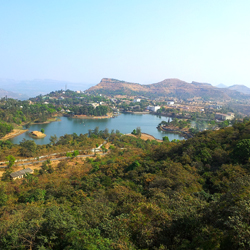
Saputara is an enchanting hill station located in the quaint region of Dang in Gujarat. It has a picturesque location and a serene ambiance that makes it as a perfect holiday destination. Its name translates into 'the abode of serpents'. Due to the continuous efforts put by the state government, Saputara has emanated as a well-established hill resort with the world class facilities. Shrouded amid the compelling hills of Western Ghats, Saputara has an elevation of 3000 feet above the sea level. The lofty and green terrains of this hill station span an entire area of 10 hectares. The climate of this region is described as tropical cool in nature. It faces a pleasant weather amidst the year. Saputara has the median temperatures that scale between 16°C-24°C across the year. During the monsoons, they drop down by fewer degrees and make the weather cold. Saputara offers a bouquet of attraction to all. The murky Sahyadri Hills, Vansda National Park, Purna Wildlife Sanctuary, Gira Falls, Rose Garden, and much more that cannot be missed at all.
Explore More
Widely known for the weaving craft of the popular "Patola" silk sarees, Patan is an ancient city located in north Gujarat. The city was founded by the famous king of the Chawda Kingdom, Vanraj Chawda in 745 AD. For almost 600 years, it enjoyed the status of the capital of Gujarat before getting sabotaged by Mahmud of Ghazni. As a producer of the finest textiles, it is a sought after destinations not only for the tourists but also for the textiles buyers. The climate here remains rainy throughout the year. However, the weather ranges from temperate to humid during the summer season. You can visit this town at anytime of the year for a serene vacation with your family, as it is less crowded. Some of the major tourists' attractions include Sahastralinga Talav, Rani ki vav, and Khan Sarovar. If you have the zeal to explore the mysteries of forts, heritage sites, architecture and various places of worship, then Patan is the destination you should look out for.
Explore More
The city of Gondal is located in the Indian state of Gujarat. This city was founded in the early 17th century & was ruled by the Jadeja clan. After the arrival of the British, Gondal witnessed massive infra-structural developments and today it stands among the popular tourist destinations in Gujarat. Gondal is elevated at 433 feet above the sea level. The land of Gondal, in a majority, is a jagged terrain and is fed by the tributaries of the River Indus. The climate of Gondal is moderate in nature. It faces humid temperatures during the summers with an average temperature of 37°C. The winters are pleasant as the median temperature rests between 10°C-15°C. The monsoons in Gondal are usually accompanied by the thunderstorms & it receives an adequate amount of rainfall. Gondal is the home to numerous historical monuments and temples that ensnare the visitors. The Naulakha Palace is a 17th century splendor that is the prime attraction in Gondal. Close to it, Huzoor Palace and Orchard Palace are located the catch the sight of the visitors. The other places of interest include the names like Swaminarayan Temple & Dasi Jeevan Temple.
Explore More
Palitana is a city located in Bhavnagar district in Gujarat. It is known as a major pilgrimage center for the followers of Jainism. It was founded in the mid-eleventh century and had served as an erstwhile princely state of India. The hundreds of Jain pilgrims flock to Palitana to pay homage to the Jain pantheons. Palitana is elevated 217 feet above the sea level and sprawls over vast acres of land. The climate of the place is classified as subtropical. With such climate, Palitana encounters pleasant temperatures throughout the year. It experiences pleasant summers where the median mercury level rests at 33°C. During the winters, the average mercury level drops down at 8°C and it receives a sufficient amount of rainfall. The annual precipitation received is 2700 mm. Palitana, majorly, is a pilgrimage site for the Buddhists but hundreds of Non-Buddhists also swarm to this beguiling place. The temples that were erected in the 11th & 12th centuries still exist there. More than 800 intricately carved Jain temples are thronged by the pilgrims on a large scale.
Explore More
Mandvi is a beguiling town in Gujarat that was founded in the 15th century. The region of Mandvi was ruled by different dynasties like Kshatriya Gujjar, Gohil, Bhatti, Rathore, Jethwa, Solanki & Vishvaria Brahmin. In the previous times, Mandvi was fortified but the fortification was demolished when the British took over the authority. Mandvi is elevated 50 feet above the sea level and is entrenched on the banks of Rukamavati River. With its closer proximity to the water-body, the climate of Mandvi is classified as temperate in nature. It encounters warm temperatures amid the year. The average temperature scales between 27°C-39°C. During the monsoons, the city receives a heavy amount of rainfall accompanied by thunderstorms. The annual average rainfall received by Mandvi is 3000 mm. There are many tourist places that are worth visiting in Mandvi. The remarkable tourist attractions in Mandvi are Ashapura Temple, Shiva Beach, Rukmavati Bridge, Mandvi Swaminarayan Temple, Vijay Vilas Mahal & Adishwar Jinalaya.
Explore More
Surendranagar is a district located in the Indian state of Gujarat. This city was ruled by the Jhala Rajputs and is also known as the twin city of Wadhwan. During the rule of Rajputs, many buildings, gates, and other structures were constructed in Surendranagar. Today, it is reckoned amid the most popular travel destinations in Gujarat. With an elevation of 1,795 feet, Surendranagar unfolds across 10,400 sq. km. Its land, in a majority, is a rough terrain and is fed by the waters of the River Bhogaavo. It has a moderate climate. During the summers, the median mercury level ranges between 37°C-41°C. It falls down and rests between 10°C-14°C during the winter season. It receives an ample amount of rainfall during the monsoon. There are different must-visit places located in Surendranagar. The remarkable destinations include the names like Rajrajeshwari Temple, Gangavo Kund, banks of Bhogaavo River, and the local astir markets.
Explore More
Sasan, along with Gir, is a national park located in the Indian state of Gujarat. It is an exuberant travel destination that is thronged by the travelers on a large scale. This national park was established in the year 1965 & is the sole residence of the feline predator Asiatic lion. The state government & some NGOs protect and promote Sasan-Gir as a tourist destination in Gujarat. Sasan is an exotic place that is unrolled over an area of 1,400 sq. km. The uneven plains of Sasan are irrigated by the waters of the 7 rivers like Godavari, Hiren, Shetrunji, Macchundri, Shinoda, Raval, and Datardi. The climate of the region of Sasan is classified as tropical humid in nature. It encounters searing summers with an average temperature of 37°C and mild winters with a median mercury level of 23°C. It receives a less amount of rainfall as per its requirement. Sasan is an amazing travel attraction. It is the home of the king of woods, Asiatic lion and it can be seen lurking amid the grasslands of Sasan. The other species include the names like Chinkara deer, Nilgai, Gaur, Indian bison, crocodiles, and much more.
Explore More
Wankaner is a city that lies in the Indian state of Gujarat. It was an erstwhile princely state with the same name during the British rule in India. Wankaner was founded in the 16th century by the eldest son of Raj Chandrasinghji. This state was known as the '11 gun salute state' under the British rule. In the year 1948, it acceded to the Indian Union. The city of Wankaner nestles at a height of 266 feet above the sea level. Its rough terrains unfold over an entire area of 1,075 km. sq. The climate of this region is described as a local steppe in nature. The median mercury levels of Wankaner scale between 28°C-40°C during summers, whereas, they range between 7°C-16°C during winters. Wankaner receives scanty rainfall with an annual average of 563 mm. If you are on a trip to Wankaner, you can visit numerous bewitching attractions. The prime highlights of this city that lure visitors are Ranjit Vilas Palace, Shah Bava Dargah Sharif, Royal Oasis Hotel & Palace, Swaminarayan Temple, Macchu Dam, local markets of Wankaner etc.
Explore More
Kevadia, located in the Narmada district of Gujarat, is a scenic town best known as the home of the Statue of Unity, the world’s tallest statue. Nestled along the banks of the Narmada River and surrounded by the Satpura and Vindhya hills, Kevadia offers a perfect blend of nature, culture, and modern infrastructure. It has rapidly developed into a major tourist destination with attractions like the Valley of Flowers, Jungle Safari, and Sardar Sarovar Dam. Well-connected by road, rail, and air, Kevadia is ideal for travelers seeking a unique and enriching experience in the heart of Gujarat.
Explore MoreGujarat is a north-western state of India. In the north of Gujarat lies Rajasthan and in the south it is bounded by Maharashtra. The state shares its eastern border with Madhya Pradesh. The extreme west of Gujarat is an international border with Pakistan and a beautiful coastline of Arabian Sea.
Many corporate magnates like Azim Premji, Dhirubhai Ambani and Jamsetji Tata belonged to this land and this says for the important role Gujarat played in the Indian economic history. Politically also, Gujarat is a very prominent state of India. And this prominence can also be well seen in the up-to-date tourists’ facilities made available by the government of Gujarat.
Gujarat in fact is a magnificent piece of land on the face of India. It is endowed with scenic natural beauty, big natural reserves and the unique White Desert of Kutch. Commonly known as the great Rann of Kutch, this desert looks like the surface of moon on a full-moon night. The famous Gir Forest National Park in Gujarat is the abode of the king of jungle, lion.
From October to February are the months to fully enjoy Gujarat Tours. Gujarat Travel Guide is what the information at this online platform will serve you as. And the list of to-do Activities In Gujarat goes as sightseeing, wildlife safaris, water skiing, para-sailing, speed boating, exploring nature and so on.
Indian Rupee
UTC+05:30
60,383,628
Gujarati
October to February
+91 79
Ahmedabad
196,024 km²
Gujarat is situated on the Western Indian coast having a 1,600 Kms long Arabian Sea coastline that encloses Gujarat from three sides. It stretches from Kutch in the West to Daman in the South and the hilly tract from Aravalli in the East to the Western hills. It lies in the north east of the Gulf of Cambay. On its western and southwestern boundaries lies the Arabian Sea. To the northwest lies the country of Pakistan. Northeast lies the State of Rajasthan, east lies the State of Madhya Pradesh and to the southeast lies the State of Maharashtra.